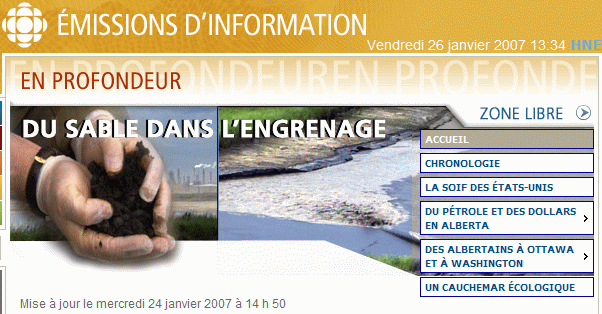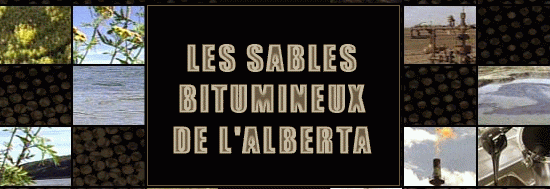

Radio-Canada's oil sands 'scoop' dug up nothing
Radio-Canada's oil sands 'scoop' dug up nothing
Radio-Canada's oil sands 'scoop' dug up nothing
Konrad Yakabuski
The Globe and Mail
Jan 25, 2007
Canada's public TV network is a two-headed, English-French creature with a mandate to foster a "shared national consciousness." Just how it's supposed to do this when it speaks out of two mouths, in two languages and to two different audiences is one of those great Canuck incongruities that gets shuffled under the carpet in Ottawa, where the myth of a benevolent bilingual broadcaster lives on.
This would be forgivable enough if all it meant was that francophone Canadians were spared the piercings of George Stroumboulopoulos while anglophones missed out on the weekly celebrity skewering that is Tout le monde en parle .
The damage done by Radio-Canada's programming last week of a sensationalist documentary on the development of Alberta's oil sands makes it all much harder to excuse or ignore. The episode of Zone Libre -- a fifth estate -like show -- single-handedly (and unjustly) did far more to promote suspicion of Alberta than it did to inform Quebeckers about the stakes involved in developing the biggest oil reserves outside of Saudi Arabia.
The show's primary "scoop" was its claim to have obtained secret minutes from an early 2006 meeting in Houston between oil industry types and Canadian and U.S. government officials in which the participants promised to pull out all the stops -- including streamlining environmental reviews -- to facilitate a fivefold increase in oil sands production. The show suggested this was to be accomplished by 2015 -- all to satisfy George W. Bush's desperate quest to reduce U.S. reliance on Mideast oil.
If viewers were still too dumb to figure out this would be an environmental calamity, they were treated to menacing music and images of northern Alberta's scarred landscape. When journalism needs a musical score to gets its message across, can you still call it journalism?
Radio-Canada would not have had to look too far to find an expert to explain the logistical and economic impossibility of expanding oil sands output so rapidly. Doing so would send the price of a double-double at the Fort McMurray Tim Hortons outlet higher than a barrel of West Texas intermediate.
What's more, the show didn't state that the "secret" report had been available for months to anyone with an Internet connection and, more important, had set out no timetable at all for the said increase in oil sands production. What the broadcast did establish in the viewers' mind was the indelible impression that the Conservatives' eagerness to scrap the previous Liberal government's Project Green -- its plan to reduce its greenhouse gas emissions -- stemmed from their own indebtedness to Big Oil, Republican advisers, and the C.D. Howe Institute.
The Toronto-based think tank's list of members, journalist Guy Gendron pointed out, "reads like the telephone book for the Alberta oil industry." The report then credits a C.D. Howe study released last spring for providing the ideological underpinning for the Tories' decision to abolish a string of Liberal environmental programs.
Did Mr. Gendron and his researchers read the report? Titled Burning our Money to Warm the Planet, the study does indeed denounce the ineffectiveness of the Liberal measures. Why? Because the Liberals relied on voluntary compliance and did not sufficiently crack down on Big Oil by imposing mandatory limits on carbon emissions. What's more, the report's lead author was Mark Jaccard, the Simon Fraser University professor and carbon tax proponent who inspired Liberal leadership candidate Michael Ignatieff's environmental proposals.
The oil and gas industry is no different than any other. It seeks to maximize profits with a minimum of government interference, unless, of course, that intervention involves subsidies. So, a healthy suspicion of its lobbying objectives is an essential journalistic tool.
Likewise, there is much to criticize in the Conservatives' early attempts at an environmental policy. The problem is that the Tories were very publicly restoring a series of Liberal programs at the very moment Radio-Canada was airing the Zone Libre documentary -- excerpts of which were fodder for Le Téléjournal nightly news for three days running.
Why are the Conservatives restoring those programs? Because no issue gets as much ink these days as the environment. The result is that even the Tories may soon succumb to the wisdom of a carbon tax. As for Big Oil, it can count on endless scrutiny by its official opposition, Big Environment, and experts such as Prof. Jaccard. And so it should be.
Zone Libre did neither Quebeckers nor that elusive "shared national consciousness" any favours with such a lopsided exposé.
Posted by Arthur Caldicott on 26 Jan 2007
